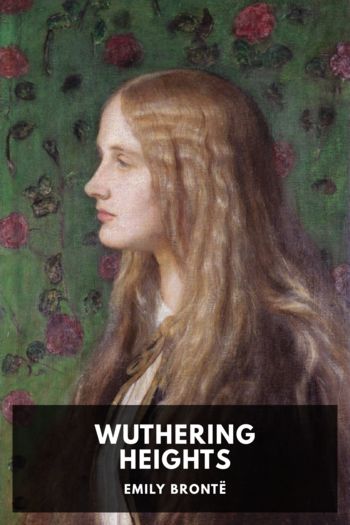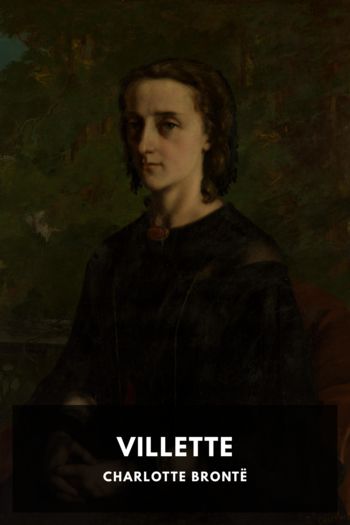Shirley by Charlotte Brontë (best books to read for teens .TXT) 📕

- Author: Charlotte Brontë
Book online «Shirley by Charlotte Brontë (best books to read for teens .TXT) 📕». Author Charlotte Brontë
“I am going, however, Mr. Moore,” said the rector sternly. “Come with me or not, as you please.”
“Nay, he shall not have the choice; he shall go with you,” responded Yorke. “It’s midnight, and past; and I’ll have nob’dy staying up i’ my house any longer. Ye mun all go.”
He rang the bell.
“Deb,” said he to the servant who answered it, “clear them folk out o’ t’ kitchen, and lock t’ doors, and be off to bed.—Here is your way, gentlemen,” he continued to his guests; and, lighting them through the passage, he fairly put them out at his front door.
They met their party hurrying out pell-mell by the back way. Their horses stood at the gate; they mounted, and rode off, Moore laughing at their abrupt dismissal, Helstone deeply indignant thereat.
V Hollow’s CottageMoore’s good spirits were still with him when he rose next morning. He and Joe Scott had both spent the night in the mill, availing themselves of certain sleeping accommodations producible from recesses in the front and back countinghouses. The master, always an early riser, was up somewhat sooner even than usual. He awoke his man by singing a French song as he made his toilet.
“Ye’re not custen dahn, then, maister?” cried Joe.
“Not a stiver, mon garçon—which means, my lad. Get up, and we’ll take a turn through the mill before the hands come in, and I’ll explain my future plans. We’ll have the machinery yet, Joseph. You never heard of Bruce, perhaps?”
“And th’ arrand (spider)? Yes, but I hev. I’ve read th’ history o’ Scotland, and happen knaw as mich on’t as ye; and I understand ye to mean to say ye’ll persevere.”
“I do.”
“Is there mony o’ your mak’ i’ your country?” inquired Joe, as he folded up his temporary bed, and put it away.
“In my country! Which is my country?”
“Why, France—isn’t it?”
“Not it, indeed! The circumstance of the French having seized Antwerp, where I was born, does not make me a Frenchman.”
“Holland, then?”
“I am not a Dutchman. Now you are confounding Antwerp with Amsterdam.”
“Flanders?”
“I scorn the insinuation, Joe! I a Flamand! Have I a Flemish face—the clumsy nose standing out, the mean forehead falling back, the pale blue eyes ‘à fleur de tête’? Am I all body and no legs, like a Flamand? But you don’t know what they are like, those Netherlanders. Joe, I’m an Anversois. My mother was an Anversoise, though she came of French lineage, which is the reason I speak French.”
“But your father war Yorkshire, which maks ye a bit Yorkshire too; and onybody may see ye’re akin to us, ye’re so keen o’ making brass, and getting forrards.”
“Joe, you’re an impudent dog; but I’ve always been accustomed to a boorish sort of insolence from my youth up. The ‘classe ouvrière’—that is, the working people in Belgium—bear themselves brutally towards their employers; and by brutally, Joe, I mean brutalement—which, perhaps, when properly translated, should be ‘roughly.’ ”
“We allus speak our minds i’ this country; and them young parsons and grand folk fro’ London is shocked at wer ‘incivility;’ and we like weel enough to gi’e ’em summat to be shocked at, ’cause it’s sport to us to watch ’em turn up the whites o’ their een, and spreed out their bits o’ hands, like as they’re flayed wi’ bogards, and then to hear ’em say, nipping off their words short like, ‘Dear! dear! Whet seveges! How very corse!’ ”
“You are savages, Joe. You don’t suppose you’re civilized, do you?”
“Middling, middling, maister. I reckon ’at us manufacturing lads i’ th’ north is a deal more intelligent, and knaws a deal more nor th’ farming folk i’ th’ south. Trade sharpens wer wits; and them that’s mechanics like me is forced to think. Ye know, what wi’ looking after machinery and sich like, I’ve getten into that way that when I see an effect, I look straight out for a cause, and I oft lig hold on’t to purpose; and then I like reading, and I’m curious to knaw what them that reckons to govern us aims to do for us and wi’ us. And there’s many ’cuter nor me; there’s many a one amang them greasy chaps ’at smells o’ oil, and amang them dyers wi’ blue and black skins, that has a long head, and that can tell what a fooil of a law is, as well as ye or old Yorke, and a deal better nor soft uns like Christopher Sykes o’ Whinbury, and greet hectoring nowts like yond’ Irish Peter, Helstone’s curate.”
“You think yourself a clever fellow, I know, Scott.”
“Ay! I’m fairish. I can tell cheese fro’ chalk, and I’m varry weel aware that I’ve improved sich opportunities as I have had, a deal better nor some ’at reckons to be aboon me; but there’s thousands i’ Yorkshire that’s as good as me, and a two-three that’s better.”
“You’re a great man—you’re a sublime fellow; but you’re a prig, a conceited noodle with it all, Joe! You need not to think that because you’ve picked up a little knowledge of practical mathematics, and because you have found some scantling of the elements of chemistry at the bottom of a dyeing vat, that therefore you’re a neglected man





Comments (0)